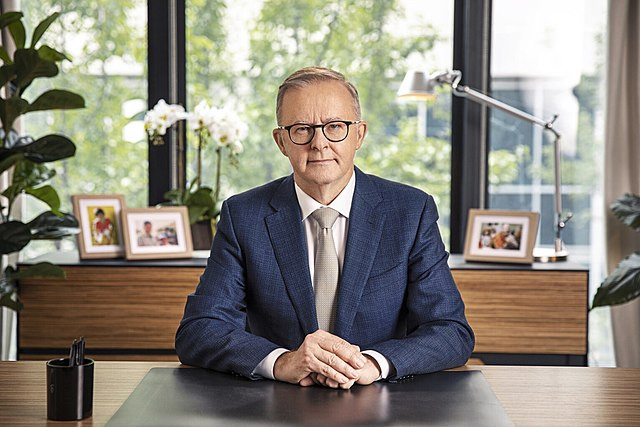Australian Prime Minister Anthony Albanese met with Chinese President Xi Jinping on Tuesday in a bid to stabilize relations after years of diplomatic and trade tensions, pledging to pursue cooperation and open communication despite persistent geopolitical rifts across the Indo-Pacific.
"Dialogue needs to be at the centre of our relationship," Albanese told Xi during opening remarks at the Great Hall of the People. Xi, speaking through an interpreter, responded that "no matter how the international landscape may evolve, we should uphold this overall direction unswervingly."
The leaders met against the backdrop of renewed global instability and escalating pressure from U.S. President Donald Trump's trade policy toward China. Albanese emphasized Australia's independence in managing its relationship with Beijing, stating that "we have strategic competition in the region but we continue to engage in order to support peace and security."
China has sought to capitalize on shifting geopolitical dynamics, attempting to position itself as a stable trade partner. Xi said China was prepared to "promote further development in the China-Australia relationship," according to Chinese state media Xinhua.
Albanese, leading a business-heavy delegation that includes top executives from Rio Tinto, BHP, Fortescue, and Bluescope Steel, said a decade-old trade pact with China would be reviewed and highlighted potential cooperation on decarbonization. However, he also raised key areas of concern, including a February Chinese naval live fire drill near Australian waters and the suspended death sentence imposed on Chinese-Australian academic Yang Hengjun.
"I said what I said at the time: it was within international law, there was no breach of international law by China, but that we were concerned about the notice and the ways that it happened, including the live fire exercises," Albanese said, adding that Xi acknowledged Australia's right to conduct its own military exercises.
Regarding Yang's case, Albanese stated: "President Xi Jinping and I agreed dialogue must be at the centre of our relationship," but acknowledged he did not expect a quick resolution.
Notably absent from the talks was the issue of the Darwin Port, which is under a 99-year lease to a Chinese company. While the Albanese government has previously indicated its intent to bring the port back under Australian control, the matter was not discussed in Tuesday's meeting.
Tensions over Taiwan also linger. The Trump administration has reportedly urged Australia to clarify its position on a potential military conflict with China. Albanese reiterated support for maintaining "the status quo," while Coalition Senator James Paterson noted, "It wouldn't be appropriate for the U.S. government to ask Australia to do more than the United States is willing to do in relation to that."
China imposed $20 billion in trade sanctions on Australia beginning in 2020 following a series of disputes, including Australia's call for a COVID-19 origin probe and tightened foreign investment screening. The current six-day visit signals a mutual interest in easing these restrictions, though key differences remain.
Later Tuesday, Albanese was expected to meet with Chinese Premier Li Qiang, further deepening bilateral economic and diplomatic discussions.






